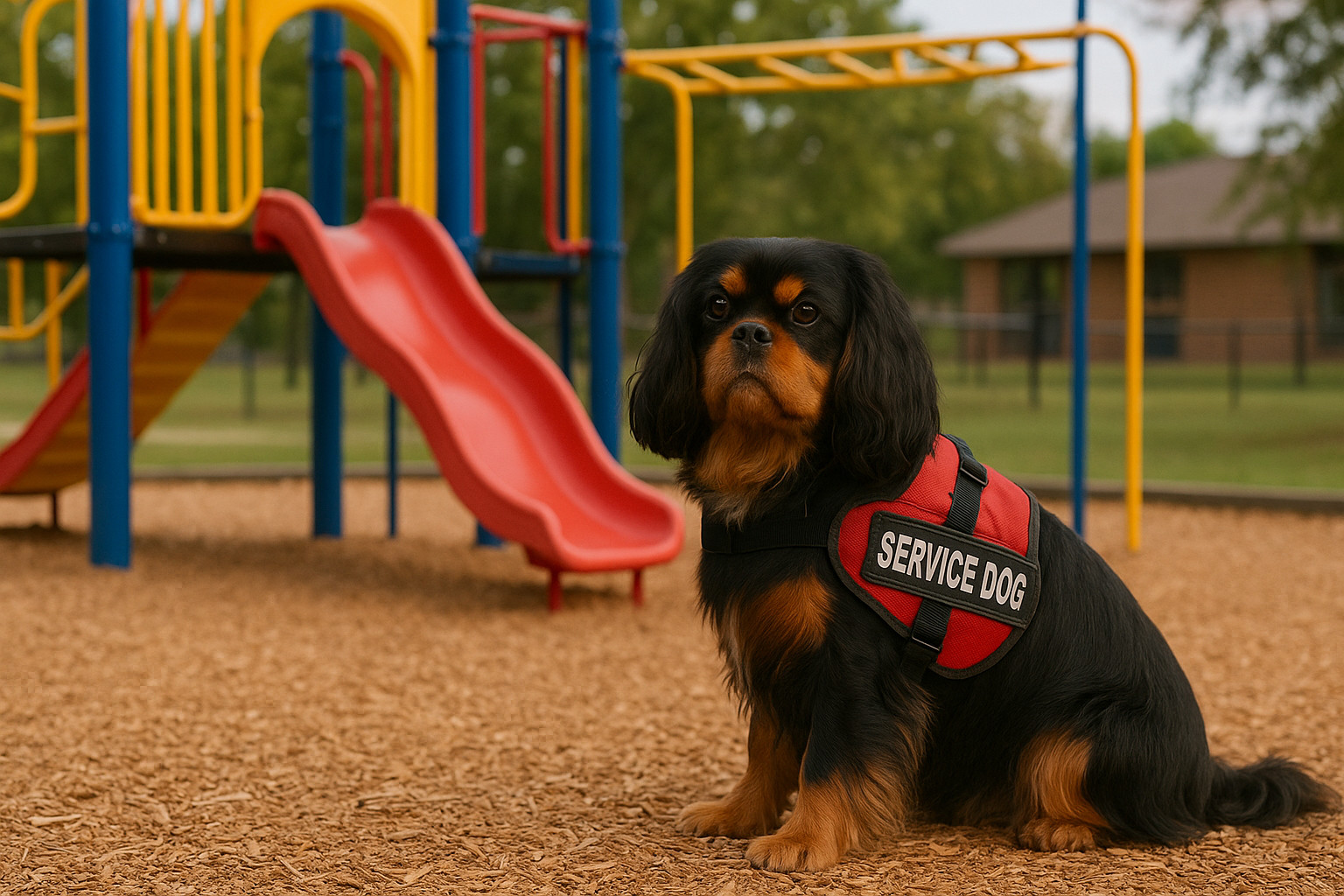English Toy Spaniel as a Service Dog

English Toy Spaniels, also known as "Charlies," are small, charming dogs, best known for their aristocratic history as companions to royalty. Despite their rich history and endearing presence, when considering them as service dogs, there are several factors to take into account, including their size, temperament, specific aptitudes, and potential health issues.
English Toy Spaniel Overview
The English Toy Spaniel is a toy breed, celebrated for its affectionate nature and compact size. Historically appreciated as lapdogs in the regal courts of England, these spaniels are known for their calm demeanor and loyalty. However, their suitability as a service dog varies based on the type of service work required.
Physical Characteristics
English Toy Spaniels are small dogs, weighing between 8 to 14 pounds and standing approximately 10 to 11 inches tall at the shoulder. Their small size and delicate structure inherently limit their capacity for certain types of service tasks, particularly those requiring physical strength or stamina.
- Size and Strength: Their stature makes them less ideal for tasks that require physical strength, like mobility assistance. They are unable to provide the physical support necessary for these roles.
- Energy Levels: Typically, English Toy Spaniels have moderate energy levels. They are capable of being active but prefer short play sessions and frequent rests. This can be a benefit for handlers requiring a dog with a calm presence, as they are less likely to become overstimulated in a variety of environments.
Their physical makeup offers distinct advantages in some contexts but also restricts their capacity in others. Their small, manageable size makes them well-suited for living in smaller spaces or crowded urban environments.
Temperament and Attitude
The temperament of the English Toy Spaniel embodies traits such as affection, gentleness, and a tendency towards forming strong attachments with their owners. These qualities align well with the demands of specific types of service work, particularly those centered around emotional support.
- Affectionate Nature: These dogs are inherently affectionate and enjoy spending time with their humans. Their love for companionship often helps individuals battling emotional or mental health challenges, making them ideal candidates for emotional support animals (ESA).
- Behavior in Public: In public environments or under stress, English Toy Spaniels generally remain composed, though their sensitive nature can lead to anxiety in chaotic or overly stimulating settings. This temperament necessitates slow and careful acclimatization to varied environments.
- Alertness and Responsiveness: While they might bark to alert, they do not possess the intense drive or need for a "job" seen in many working breeds. Their moderate alertness along with a less dominant nature is usually favorable in therapeutic settings.
Types of Service Work
Considering their physical and temperamental traits, English Toy Spaniels are most suitable for the following types of service work:
- Emotional Support Animals (ESA): Their primary capabilities align with providing emotional support to individuals who benefit from close companionship, due to their inherent affectionate and calming presence.
- Therapy Dogs: They may thrive as therapy dogs in controlled environments like hospitals, nursing homes, or schools, where their gentle nature can be put to good use.
- Psychiatric Service Dogs for Mild Needs: They might support individuals with psychiatric conditions by providing companionship and comfort, though extensive task-based support may be beyond their abilities.
Due to their size, they’re not ideal for roles that require physical tasks, like retrieving items or providing mobility assistance. They lack the muscle and build to perform such demanding physical tasks effectively.
Health Considerations
The health of a service dog is paramount, as their tasks often rely on their ability to remain fit and active. English Toy Spaniels have specific health conditions to consider:
- Common Health Issues: This breed can be prone to several hereditary conditions, including heart diseases like mitral valve disease, respiratory problems due to their brachycephalic (short-nosed) nature, and eye conditions such as cataracts.
- Longevity and Maintenance: They generally live between 10 to 12 years but may require regular veterinary check-ups to monitor for and treat potential health issues early. Regular grooming is also required to maintain their coat.
- Impact on Service Work: Any underlying health issue can impede their ability to perform consistent duties, thus making regular health evaluations essential for longevity in their service roles.
Training and Suitability
Trainability is a crucial aspect of any service dog’s efficacy. English Toy Spaniels, while intelligent, possess a somewhat independent streak that can influence training.
- Training Approach: Gentle, consistent training using positive reinforcement is essential. Due to their sensitive nature, harsh training methods may negatively affect their performance and willingness.
- Intelligence and Adaptability: They are quite intelligent and have moderate adaptability; however, their training sessions should be kept interesting and varied to maintain their engagement and prevent boredom.
- Focus and Consistency: The consistency in training is vital as they may become selectively responsive to commands, particularly in high-distraction environments. Their motivation often relies on the desire for companionship and praise.
Summary of English Toy Spaniel
In conclusion, the English Toy Spaniel, with its petite size and affectionate nature, offers specific strengths in the world of service and support dogs, especially in emotional contexts. However, they are less suited for physically demanding roles due to their limited strength and endurance capacities.
- Strengths:
- Highly affectionate and companionable
- Calm and composed in controlled environments
- Ideal for emotional support and therapy roles
- Weaknesses:
- Limited physical strength for mobility assistance
- May suffer from health conditions impacting longevity and service performance
- Susceptible to anxiety in overly stimulating environments if not properly acclimatized
- Ideal Service Roles:
- Emotional Support Animal (ESA)
- Therapy Dog
- Psychiatric Service Dog (for non-intensive tasks)
While English Toy Spaniels provide valuable emotional support, their practical capabilities are constrained, necessitating careful consideration when evaluating their suitability for specific service tasks. Proper training and environment adaptation can enhance their utility in suitable roles, ensuring they remain comfortable and effective in their designated tasks.











